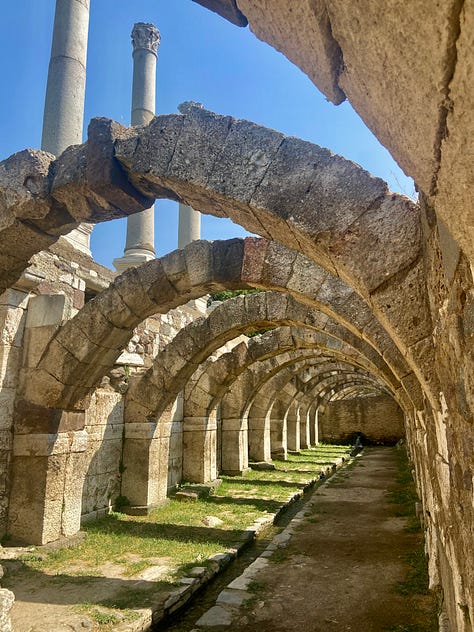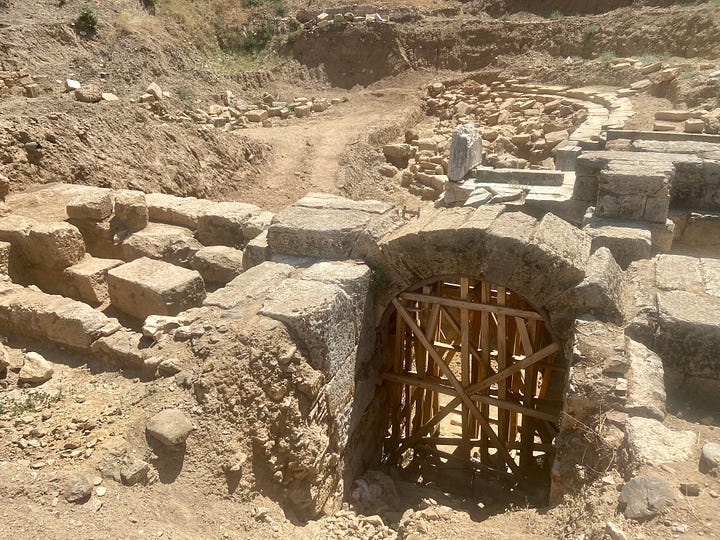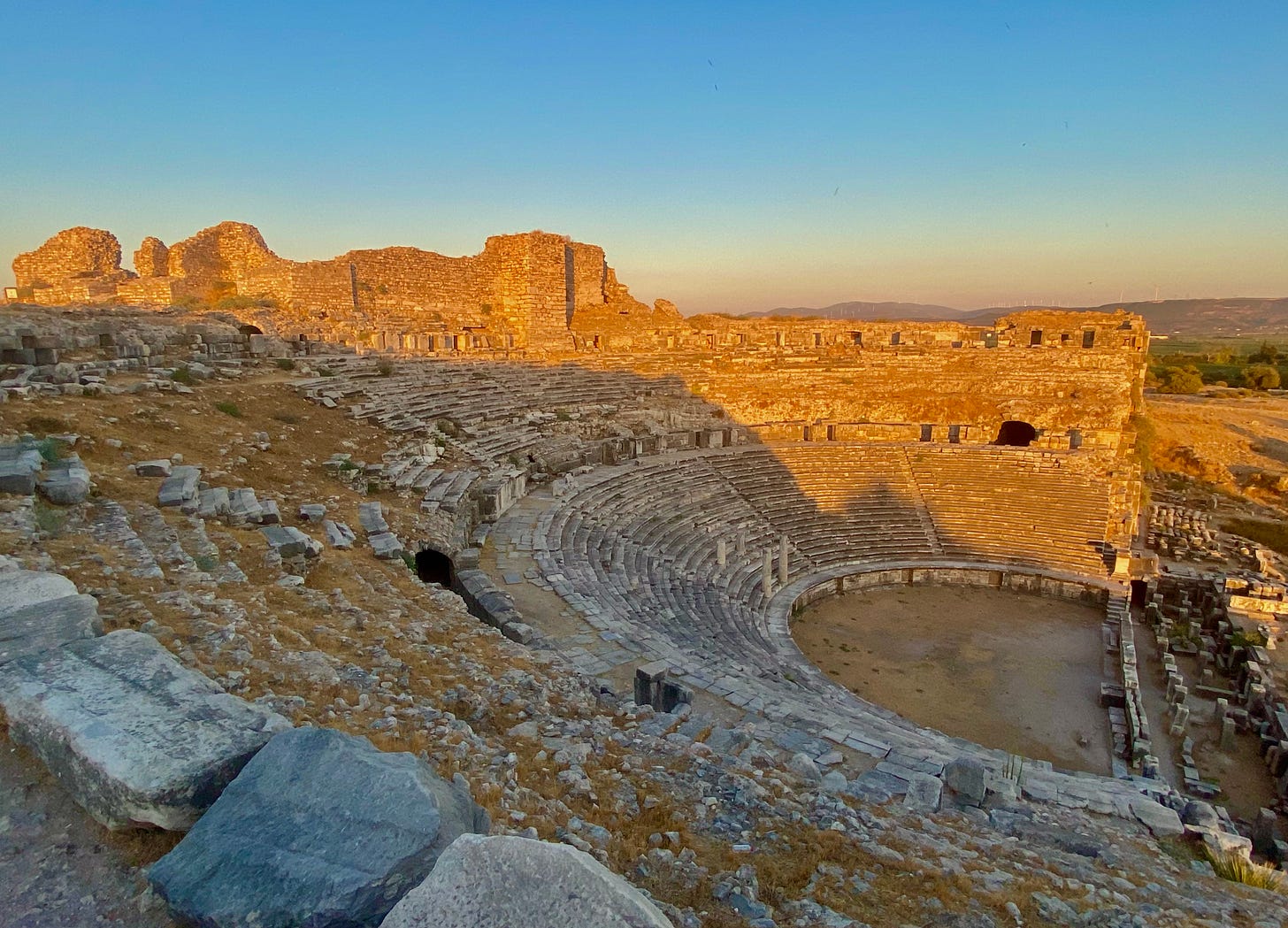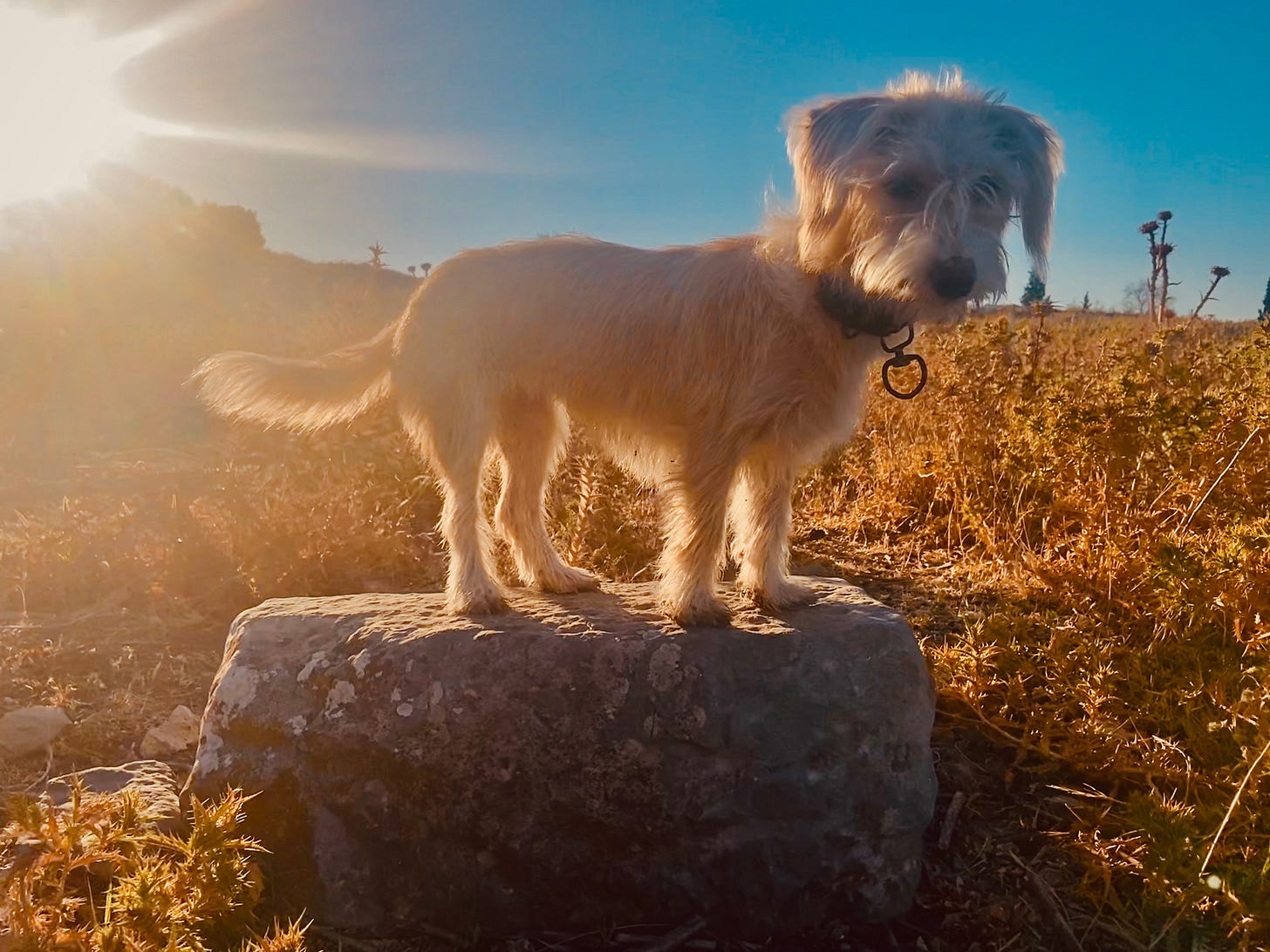Ever slept beneath the stars in an ancient amphitheater?
I hadn’t either … until yesterday.
Visiting the 7 Churches of Revelation
My previous week of travel through the seven churches mentioned in the book of Revelation was a blur. Updates from each location coming soon, as I think each warrants its own story.







Prior to embarking on this adventure, I was repeatedly told that this route is nearly impossible without one’s own transportation, so I opted for a rental car instead of booking a rigid guided tour. While I typically prefer local transport, renting my own car on this assignment felt important. This decision also saved me several hundred dollars and afforded me the flexibility to blaze my own trail while exploring at an intense, yet relaxing pace.
After checking the seventh church off the list in just three days, I returned the car on Thursday evening and returned to Selçuk. If you’ve been following my journey, you know that I spent a month living in Selçuk (nearby ancient Ephesus). My plan was to depart Selçuk on Friday morning.
The pastor, whose home I’ve been staying in, reminded me of other fascinating ruins in nearby Miletos. And, since Dr. Gayle, a biblical scholar and cultural ethnographer, had spoken to me about this exact location—Miletos—years before, I opted for a short one-day excursion instead of catching the bus to Antalya.
After all, the ruins were close … or so I thought.
The Journey to Miletos
Reaching the ruins of Miletos, just outside the small farming village of Balat, meant a series of bus transfers (Selçuk to Kuşadası, Kuşadası to Soke, Soke to Didim, Didim to Balat). My Turkish is improving, as I was able to determine all of that on the fly and even slip in a side excursion to visit an ancient Temple of Apollo in Didim where I recorded a word to be shared at a later date about false prophets (Didiyim was the second largest oracle in antiquity).
What I had not accounted for on my journey—as the minibus pulled away into the setting sun after dropping its last passenger (me) at the end of the dusty route—is that there is not another bus in Balat until morning. Sure, I could have trekked several kilometers along the dirt road lit only by the fading sliver of the Av moon and then scavenged for a last-minute hotel, but doing so would have meant missing out on an epic adventure.
Was I prepared to cowboy camp beneath the stars in a 2000-year-old amphitheater?
Nope.
As swarms of mosquitoes overtook me just after the sun set, I began to question my sanity, especially considering that I was wearing my official Turkish attire: black knee-length shorts and a tan short-sleeve v-neck.
No pack. No water. No food.
Just a phone (that died with the sunset), a phone charger (that wouldn’t find juice until morning) and a pocket full of cash (with nothing to buy).
In retrospect, I’m not certain whether the mosquitoes buzzing in my ears subsided because of the sudden drop in ambient temperature or because of my prayers, but peace came over me as I warmed myself on a large flat stone that had been baking in the hot afternoon sun about halfway up the amphitheater steps.
The moon slice quickly dipped beneath the horizon as I dozed off to the procession of the equinox overhead. As I recounted the ancient story written in the stars, Abba spoke to me about a healthy fear of the Lord.
The Fear of the Lord
I awoke, startled. Abba said I do not fear Him!
That’s a humbling word to hear. While I do my best to walk submitted to the King, I am still in the refiner’s fire. In the silence, He explained that a healthy fear of the Lord would burn away any lingering thoughts of my old life.
I am well acquainted with the Father’s love, as that has been a good portion of my healing journey over the last few years. The Fear of the Lord, on the other hand, is something I thought I knew, but I stand corrected. I am humbled, intrigued, and desiring more.
Yes, Abba. Yes!
An Ancient Inscription
This particular ancient theatre in Miletos, Turkey has inscriptions etched into the seating, like placards for “reserved seating”. One such inscription, written in Greek, transliterated read: “topos eioudeon ton kai theosebion,” meaning, “place of the Jews, who are also called God-fearing.”
Up until the third century when Constantine meddled in church theology, gentile believers looked and acted so much like Jews that they were almost indistinguishable. They followed the same biblical calendar, celebrated the same biblical festivals and rested on the same day together, Shabbat.
Shabbat Shalom
I did not have bread or wine prepared with me, but—from the steps of this 2000-year-old God-fearing stadium—I spoke the words of an ancient prayer aloud. This is the same prayer that Yeshua likely prayed on a weekly basis (every Shabbat), blessing the bread and the wine. It is the same prayer that followers of Abraham, Isaac and Jacob still pray weekly on Friday evenings.
Baruch ata Adonai,
Eloheinu Melech ha-olam,
hamotzi lechem min ha’aretz.
Baruch ata Adonai,
Eloheinu Melech ha-olam,
boreh p’ri hagafen.
Peace again overtook me as I nodded off to sleep, nestled into the intricate stonework. This warm stone slab would be my bed for the night, and this entire ancient amphitheater, my bedroom.
Just before dawn, gentle bells of grazing livestock woke me from my peaceful slumber on the hard stone staircase. I stretched my legs and made my way down the stadium steps. I was still alone, or so I imagined.
My Turkish Guide Dog
A small dog (kopek) met me at the entrance to the ruins. He had come up the steps earlier that night, sniffed me and stood guard all night.
He now became my official tour guide, first leading me into a vacated shop. I sought water for my parched mouth and breakfast for my empty belly, yet found a working outlet to charge my phone instead. After I caught a small charge, kopek wagged his tiny tail and we were off to explore together.
He led me through the ancient ruins on a course he knew all too well.
I paused to read placards in English and he waited patiently, then sprung to life again when we were ready. Together, we wandered through the ancient city center exploring an ancient bath with both hot and cold water (no longer running, of course), a palatial city center with rows of columns still standing, a well-preserved burial chamber for the city’s elite and an adjacent olive grove.
As I came around a bend, an old man stared back at me.
He smiled a big toothy grin and waved me over. We conversed briefly in my broken Turkish. I learned he was from the neighboring town of Balat and spends his days tending his flock. The shepherd beckoned me to follow him.
The Good Shepherd Provides
He brought me past an olive grove and into a gully filled with figs. Clearly, he was more adapted to the local surroundings (clad in long sleeves, pants, and big brown boots as opposed to my t-shirt, shorts, and sandals). He knew the local terrain and was not intimidated by the thorny briars; he took to the bushes and quickly harvested a handful of ripe figs.
Together, we ate under the shade of an olive tree.
I realized—as we shared the morning’s bounty—that he too camped beneath the stars last night. The gentle bells of livestock that woke me this morning came from his sheep rummaging in the ruins.
For him, my incredibly humbling experience beneath an open heaven was normal.
He stripped the branch of a nearby bush and handed me a fistful of leaf napkins to wipe the sticky juice from my fingers. It does not seem trivial to me that in my hour of need—when I was hungry and without food—I was fed figs from a lowly shepherd who calls this ancient city of God-fearers his home.
I pray that the testimonies from my adventures will bless you and encourage you in your own faith walk. If you find the AL3XAND3R blog encouraging, please share with friends.
I’m Gr8ful.







